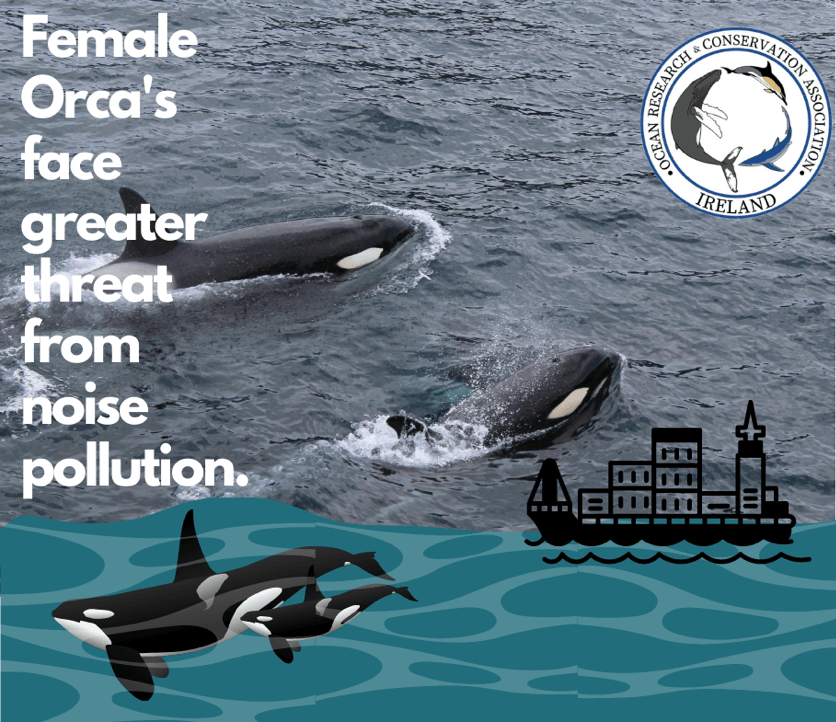Female Killer Whales face greater impact from noise pollution
FEMALE KILLER WHALES FACE GREATER IMPACT FROM NOISE POLLUTION
Danielle Brennan | Communications Officer | 15th March 2022
Recent research has shed further light on the need to effectively manage the distance of vessels to cetaceans, with a focus on killer whales (Orcinus orca). Interestingly, it was found that females displayed greater negative impacts from disturbance from whale watching vessels. Considering the long-lived nature of whales, this is concerning, but particularly the importance of females in their reproductive role in killer whale populations, to ensure the future persistence of the species. Nevertheless, noise pollution is still highly problematic to the existence of males, also having negative impacts to their hunting and foraging behaviours. Activities like whale watching and commercial shipping among others, which are frequent in coastal regions with large human populations, all play a role through the release of noise pollution throughout their voyages.

Cetaceans use sound for survival on a continuous basis, including for foraging for prey, communication and navigation. Killer whales have been categorised into ecotypes, dependent on genetics, acoustic behaviour, appearance and foraging behaviour. In the North-Pacific ‘resident’ ecotypes, forage mainly on chinook salmon, are exceptionally dependent on their use of echolocation.
Echolocation can be defined as the production of repetitive clicks, increasing in production rate on close approach of their prey. These rapid clicks have been described as a "buzzes', and are used during the striking period of the hunt. However, noise pollution from the impact of noise pollution from introduced man-made sounds from vessels, including the use of echo-sounders, can impact the behaviour of echolocation production.
This is a growing concern among the scientific community as the northern resident killer whales have been classified as critically endangered, and may be particularly vulnerable to noise pollution. Technological advances in recent years have enabled the use of satellite tags that are attached temporally to the whale, a method referred to as ‘bio-logging instruments’ to help scientists determine the potential impact of noise pollution to foraging killer whales.
A recent study, by Holt et al., (2021), used temporary suction-cup bio-logging instruments, known as "Dtags" to determine if fewer dives were made by whales in attempt to catch prey when vessels were within a 366m. The Dtag contained two hydrophones, pressure, temperature, accelerometer and magnetometer sensors. Researchers identified individual animals with known sex and age from established photo-identification catalogues and found that both the gender and distance from the vessels had a large influence on the likelihood of orcas changing behaviour. In addition, as vessel speed increased, the probability of killer whales capturing prey, were shown to be reduced. Females in particular are thought to have a different respiratory state when searching for food in the proximity of nearby vessels. This has been associated with their lower body mass, compared to males, thought to increase the energetic requirements needed for diving. Additionally, female killer whales must provision and rear their young, which may also play a role in the female’s behaviour difference compared to males. Females appeared to hunt closer to the shore, unlike the males who seem to not have a preference. This can result in the decision of the female to stop hunting altogether when vessels are present. This 'ripple effect' of consequences may result in malnutrition and is of growing concern, given the potential increase and increase in vessel usage in the area.
Reference:
Holt, Tennessen, J. B., Hanson, M. B., Emmons, C. K., Giles, D. A., Hogan, J. T., & Ford, M. J. (2021). Vessels and their sounds reduce prey capture effort by endangered killer whales (Orcinus orca). Marine Environmental Research, 170, 105429. https://doi.org/10.1016/j.marenvres.2021.105429
SHARE THIS ARTICLE













